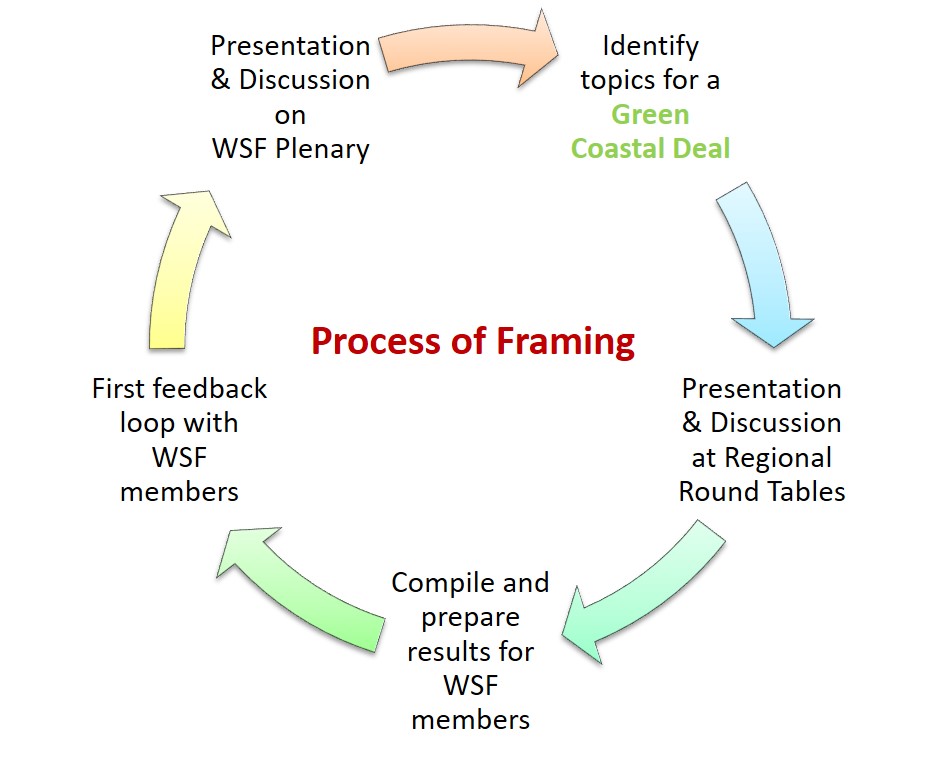November 13, 2023: the General Assembly 2023-2 decided with eleven out of twelve votes (1 not appeared) to close the WSF e.V. on December 31, 2023. With the beginning of 2024, the WSF has no workable office and the homepage will no longer be maintained. (read more)
Green Coastal Deal
at the Forum for the trilateral Wadden Sea Region

In the past years, many challenges and even worldwide crises were and sitll are demanding for a new way of socio-economic sound and ecological balanced thinking. The European Union ingest and pronounced based on many communications and strategies a climate-friendly and greener economy. Since the new European Commission was installed, the current communication (COM(2019) 640 final) on the “The European Green Deal” encourages and demands for a greener economic growth within the European Union. The core point of this EU Green Deal is the transformation of socio-economic sectors into a greener, ecological and climate friendly part of human life. Finally, for the full implementation of the idea of the EU Green Deal in all Member States and all various sectors it has to percolate through all plans, programmes, strategies, and different bodies of the European Union. Most relevant are the subsidies and financial provisions in relation to the EU Green Deal. For example, the financial provisions for the new EU Interreg B North Sea Region programme (Interreg period VI) will strongly be linked to the spirit of the EU Green Deal.
In Annex 6 of the Ministerial Declaration of the Trilateral Governmental Conference in 2001 (Esbjerg) the Forum for the trilateral Wadden Sea Region (short: WSF) was formally mentioned. The installation of the Forum for the trilateral Wadden Sea Region was encouraged, because “inhabitants and stakeholders of the Wadden Sea Region expressed their wish to have greater influence on the planning of the trilateral policy and management and the trilateral projects and actions in order to secure economic development and quality of life in a sustainable way.”
With the joint development and, in parallel, working on a “Green Coastal Deal”, the WSF was underlining its central aim sustainable development in the Wadden Sea Region.
The Core business of the WSF
The core business of the Forum for the Trilateral Wadden Sea Region was the development and implementation of sustainable solutions for the Wadden Sea Region. Since the beginning of the WSF almost 20 years ago, a broad and strong network of stakeholders in the trilateral Wadden Sea Region comprising of different branches and sectors had been continuously and persistently working on this central aim. Therefore, many parts and pieces were already available for the assembly and compounding of a Green Coastal Deal in the Wadden Sea Region.
Currently, the crisis which evolved by the corona virus indicates how fragile and vulnerable the Wadden Sea society and the respective economic sectors are. Thus, the situation is demanding for a new incentive of working together, i.e. cross-border and cross-sectoral in a strong, intimate and long-lasting network.
The Forum for the trilateral Wadden Sea Region - En route
The development and collaboration on a Green Coastal Deal for the Wadden Sea Region was based on the existing network, existing working groups and especially on relevant themes and items, the WSF had worked on in the elapsed years. Furthermore, invitations to a wider audience had been sent by new media in order to enhance the network and the capacity. Important driver was the stimulation of originally existing incentives of WSF members. Therefore, renovating and activating the involvement of existing members and recruiting new stakeholders in connection with new themes were an objective. As first step, the initiation of “Regional Round Tables” (partly) moderated by the WSF secretariat offered a launching point.
Representatives of relevant sectors and administrative bodies, which reflect different actors and stakeholders for a comprehensive and thoroughly coverage of the respective region had to compose these “Regional Round Tables”. The attendance was on voluntary basis. The main role of the WSF secretariat in the development and, finally, collaboration for a Green Coastal Deal in the WSR was to function as an exchange platform for information and experiences between all those round tables. It could have played an important role for the exchange and cooperation, especially on political level, to convey sustainable, resilient and/or green strategies, which are developed based on the results and concepts of the “Regional Round Tables”.
Suggestion for a Stepwise approach

However, how to start the process for the initiation of a collaboration on a Green Coastal Deal? Figure 1 displays the suggested process on how to frame the Green Coastal Deal within the WSF. The start was the identification of urgent and current topics either short, mid or long term oriented. This brainstorming sessions was conducted with a certain amount of volunteering participants. Ideally, the range of participants would cover different sectors and branches of the Wadden Sea Region.





